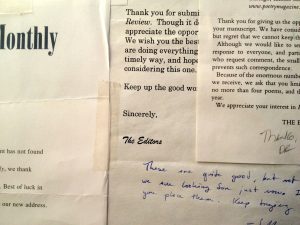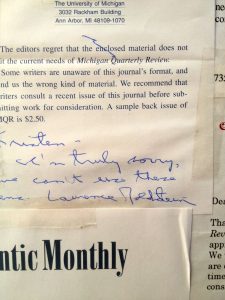 Inspired by something I saw recently on The Rumpus, the following is constructed completely from actual comments I’ve received when my work has been turned down.
Inspired by something I saw recently on The Rumpus, the following is constructed completely from actual comments I’ve received when my work has been turned down.
These comments span 14 years of rejection, from 1999 to the present. They cover all genres: TV pilots, screenplays, poems, short stories, novellas, and article pitches.
One piece that was kicked while down by one editor (“the plot lacked a clear resolution”) was praised by another (“lovely”), then went on to be a Finalist for a short fiction prize.
While rejection always burns, getting feedback and hand-written notes blunts the impact. Getting contradictory notes on the same piece is a reminder that what’s good is subjective, and that furthermore, there’s a home for everything.
Putting this little distraction project together, I was surprised at how many encouraging comments I’d received over the years. If you line them all up in a row, they take on the sound of a group of cheerleaders telling you to “Go, go, go!” For the most part, I did not resubmit to magazines that invited me to try again. I wasn’t hurt or offended; I simply got busy with life and forgot. I’m embarrassed now at the wasted opportunities to develop relationships with editors.
Rejection Poem, 1999-2013
Your hysterical letters got my attention.
I’m the first line of defense.
Send me these three scripts.
I’d like to see your synopsis.
Thanks.
Sorry.
Sorry! Thanks!
Sorry, but thanks.
Close — Top 10%!
Thanks, but this didn’t tickle my funny bone.
While I find your piece well-written, enjoyable, and significant, its scope is a little narrower than what we were after.
Thanks. Please try us again.
You remind me of Margaret Atwood.
Lovely.
Please send us more in the future.
Please resubmit.
These are quite good, but not what we are looking for just now.
Interesting imagery.
Try us with something else after September.

This piece didn’t work for us, but the editorial board is interested in your work. I hope you place them. Keep trying.
Kristen, I’m truly sorry, we can’t use these poems.
We encourage you to apply to our Fiction Competition.
Good luck to you with this short, and thanks again for sending it our way.
Very cool idea! Keep writing!
JK.
Not interested at this time.
Not interested in representing new material at this time.
Your story is not for me.
None of my producers were interested.
There was no consensus.
This tale didn’t grab my interest, I’m afraid.
The plot lacked a clear resolution and the ending was vivid but not satisfying.
Thanks for submitting, but I’m going to pass on it.
The premise is unsupported.
Funny but ultimately not for me. What are you working on now?
Please send us other material in the future. We will read it carefully.
It was cute, but we’re not doing anything.
Do try us again.
Please submit again.
Please try us again.
Please submit again in the future.
You know I can’t do much for you except to give you some advice. Create trends. Don’t follow them. All right. See ya. Have fun. And write like the wind!
If you’re a newbie writer and you stumble upon this rejection poem, here are its takeaways:
- If an editor or contest administrator rejects your work with a handwritten note or personal email, take this as a compliment. They don’t have to do this. They can send you a boilerplate rejection.
- Save all your feedback. Some may be useful in helping you to rewrite. Other comments may bolster you on a bad day.
- Keep a careful log of where you submitted things and what the results were. These logs can help you identify trends in your writing, and they can help you rediscover old pieces you’d forgotten you’d written.
- Strike while the iron is hot. If an editor rejects something but encourages you to submit again, submit again as soon as you are able. This is an open door you’re meant to walk through.
- Don’t give up. Every rejection letter is proof that you did something and put yourself out there. Keep going.
— Kristen